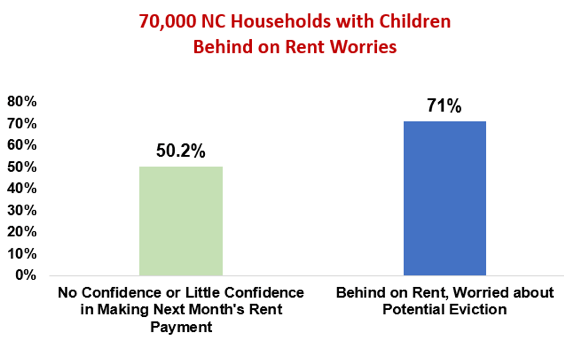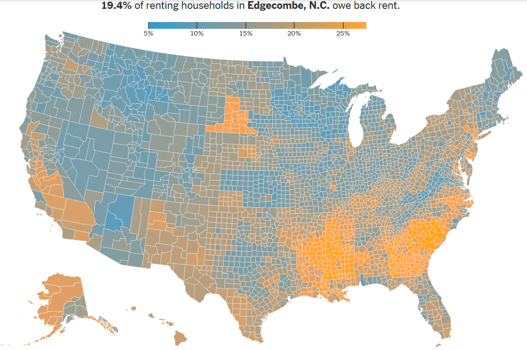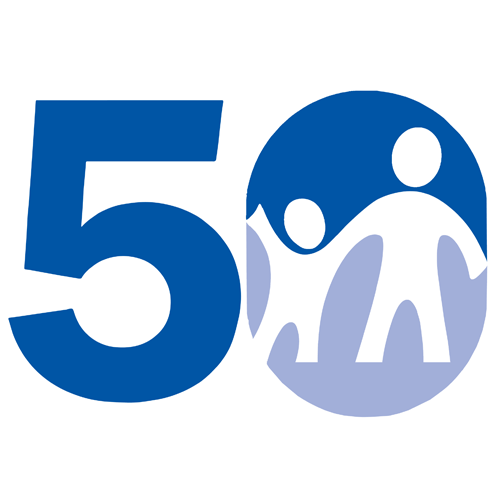The dog days of August will take on new meaning for many North Carolina families with children who are currently behind on rent. A nationwide ban on evictions issued by the Centers for Disease Control (CDC) and extended several times, is set to expire on July 31. This risk of becoming homeless as the heat and the delta COVID-19 variant rise is a parent’s worst nightmare.

The most recent Census Bureau Household Pulse survey results for North Carolina show that about 70,000 renter households with children are behind on rent.[1] More than half have no or only slight confidence that they will be able to make next month’s rent payment.[2] Of families with children behind on rent, 71% worry about eviction.[3]
The ongoing pandemic has been tough on families with children. Parents have lost jobs, had their hours cut back and scrambled to pay rent and other household expenses. The CDC eviction ban was issued to provide eviction protection to stem the spread of COVID-19. [4] With the delta variant rising, the spread of COVID-19 remains a threat, particularly in southern states where vaccination rates remain lower than the level needed to inoculate against the delta variant. Congress can extend the eviction moratorium, but with three days left before the CDC executive order expires, it is unclear what Congress will do.
Throughout North Carolina, the percentage of households behind on rent varies. For example, in Wake County, 14.1% of households are behind on rent; in Durham County, 15% of households are behind and in Mecklenburg County, 15.4% of households are behind. However, in Bertie County, 19.6% of households are behind; in Edgecombe County, 19.4% are behind; in Hyde County, 19.6% are behind and in Franklin and Robeson Counties, more than 20% of households are behind on rent. The New York Times has a map clickable by county to see the percentage of households behind on rent.
New York Times map instructions
To view the percentage of households behind on rent in your county, click on the map, and scroll down within the article until you see the map. At that point, you can click on any county or insert the name of your county in the search bar.
A direct link to the NYT article is located here. Estimates reflect data from July 5, 2021.
Emergency rental assistance is available in North Carolina in all 100 counties. The Housing Opportunities and Prevention of Evictions Program (HOPE) provides rent and utility assistance to low-income renters that are behind on rent due to the economic impacts of COVID-19. The program helps prevent evictions and utility disconnections to promote housing stability during the ongoing pandemic. More information is available here or by calling (888) 927-5467.
The policy team at PCANC recently published Economic Supports Can Prevent Child Abuse and Neglect. The report includes research-based and North Carolina-focused recommendations on how to invest in economic supports for families. You can read the policy brief here, or access the full report.
Beyond housing stability, which is an enormous concern with the eviction moratorium expiring Saturday, children in families who are homeless or who are at risk for homelessness can greatly benefit from access to high-quality child care programs. It’s time to ensure that emergency rental assistance is paired with access to high-quality child care to ensure that children receive an array of comprehensive services to promote their healthy development (in addition to housing support).
We advocate for young children to be in high-quality early learning programs. We also must advocate for them to be in safe and secure homes. Both housing and early childhood programming are essential for our children and families in N.C.!
President Biden is asking Congress to extend the ban. Congress needs to hear from you! Find your representative at https://bit.ly/2WtPnwd and call them today!
Addendum: The Federal Housing Administration (FHA) announced today an extension of its moratorium on evictions for foreclosed borrowers and their occupants through September 30, 2021, that was set to expire on July 31, 2021. FHA urges those who are behind on their mortgage payments or are having difficulty complying with the terms of their reverse mortgage or Home Equity Conversion Mortgage, and have not yet contacted their mortgage servicer, to do so immediately. Learn more about the extension.
[1] U.S. Census Bureau, Household Pulse Survey, June 23 – July 5, 2021. Table 1b. Last Month’s Payment Status for Renter Occupied Housing Units, by Select Characteristics.
[2] U.S. Census Bureau, Household Pulse Survey, June 23 – July 5, 2021. Table 2b. Confidence in Ability to Make Next Month’s Payment for Renter Occupied Housing Units, by Select Characteristics
[3] U.S. Census Bureau, Household Pulse Survey, June 23 – July 5, 2021. Table 3b. Likelihood of Having to Leave this House in Next Two Months Due to Eviction, by Select Characteristics
[4] U.S. Department of Health and Human Services, Centers for Disease Control and Prevention, Temporary Halt in Residential Evictions To Prevent the Further Spread of COVID–19, Federal Register, Vol. 85, No. 173, September 4, 2020.





